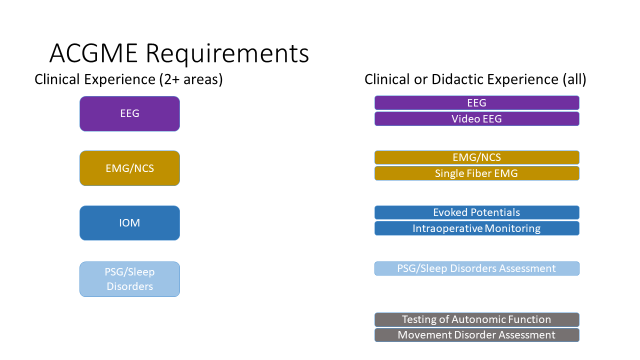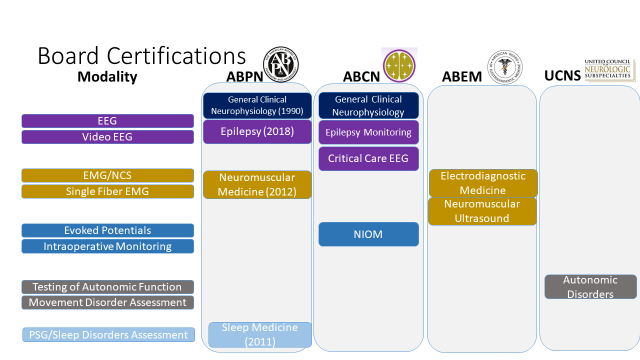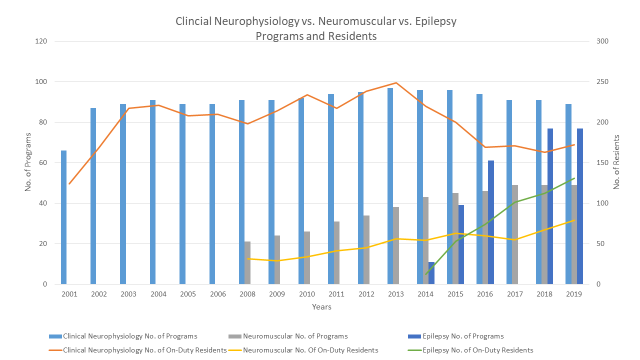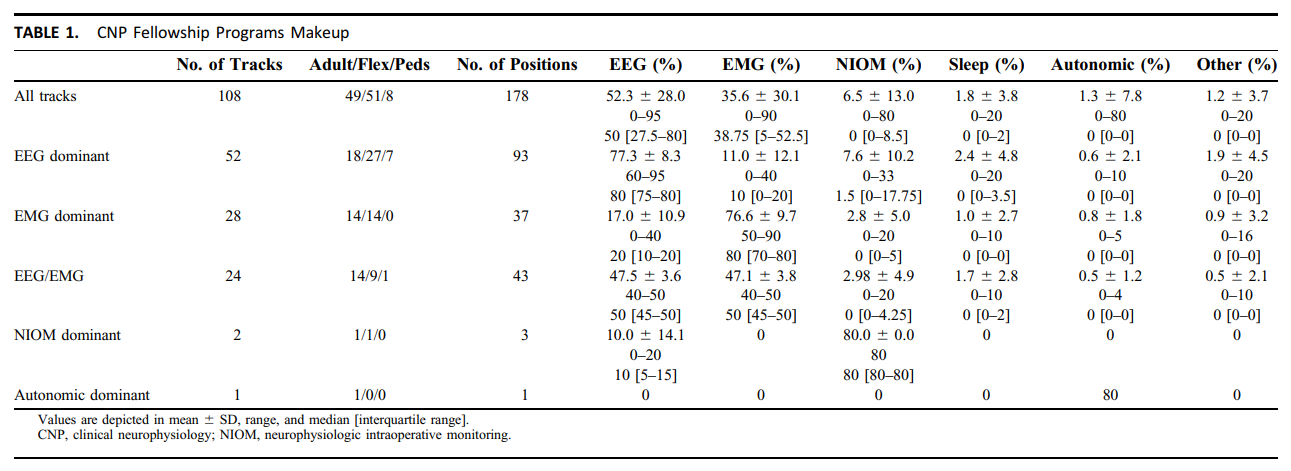- About ACNS
- Meetings
- Education
- Practice
- Research
- Advocacy
- Membership
Clinical neurophysiology is an area of medicine in which selected neurological disorders involving central, peripheral, and autonomic nervous systems and muscles are assessed, monitored, and treated using a combination of clinical evaluation and electrophysiological testing. A derangement of the normal physiology of the nervous system underlies these selected disorders, and an assessment of the electrophysiological abnormalities is an integral part of the evaluation process.
Fellows must demonstrate proficiency in the ability to accurately report results in at least two of the following:
Fellows must demonstrate competence in the application of electrical, magnetic, and mechanical methods to evaluate a wide range of diseases salient to the fellow’s two or more areas of clinical neurophysiology experience.
The program must provide education in the broad area of clinical neurophysiology, including clinical or didactic experience in:
The program must include clinical experience in at least two of the following:
If clinical education emphasizes one experience, the duration of the second experience must be at least two months.

ACGME fellows are eligible to take the American Board of Psychiatry and Neurology (ABPN) CNP board examinations after they have passed the ABPN’s Neurology Board examination (American Board of Psychiatry and Neurology - ABPN). For fellows who are not eligible or want to pursue additional certifications in modalities that are not ACGME-recognized, there are other options. The American Board of Clinical Neurophysiology has several subspecialty certifications for those interested in General Clinical Neurophysiology, Epilepsy Monitoring, Neurophysiologic Intraoperative Monitoring, and Critical Care EEG (ABCN - Home). The American Board of Electrodiagnostic Medicine also provides certification in Electrodiagnostic Medicine and Neuromuscular Ultrasound (ABEM-Home). The United Council for Neurologic Subspecialties provides certification for Autonomic Disorders (UCNS-Home).

The fields of CNP, Neuromuscular Medicine, and Epilepsy are intricately related. The field of CNP includes several tracks and tends to focus on the technical and procedural skills of EEG, EMG/NCS, EP, PSG, NIOM, and autonomic testing. The Epilepsy, Neuromuscular Medicine, and Sleep Medicine fellowships integrate the clinical evaluation and management of patients with performance of their respective procedures.
Because CNP combines knowledge in clinical and technical aspects of neurophysiology, it has been central to the development and/or growth of fields such as ICU EEG monitoring, magnetoencephalography, neuromuscular ultrasound, and neuromodulation.

(updated 9/17/2021)
Therefore, the makeup of candidate pools overlaps among the different fellowship programs. As more programs gain ACGME accreditation, the number of fellowship positions exceeds the number of fellow applicants. Fellow candidates early in their residencies may not know which fellowship program to apply to. Some fellowship programs combine multiple subspecialties in the application process for example a year of clinical neurophysiology followed by a year of epilepsy or neuromuscular training.

(presented 2/6/2020)
In February 2020, the American Academy of Neurology (AAN) issued a position statement recommending the standardization of the application and timeline for all Neurology fellowships. This recommendation recognized the lack of a uniform process for fellowship applications in terms of timelines and advancing offers 12-18 months before start dates. For CNP, Epilepsy, and Neuromuscular Medicine fellowships, the application cycle had begun as early as July of the PGY-3 year of residency. The fellowship programs request responses of the candidates within days of the interview. Several neurological subspecialties have already agreed to move towards the AAN proposal. Until recently, these fellowships had not agreed on a unified process to move in this direction.
To ensure that CNP fellowship programs are well-represented in this process, the American Clinical Neurophysiology Society (ACNS) Fellowship Match Task Force has undertaken several initiatives. ACNS distributed a survey to CNP fellowship program directors to gather information about the makeup of CNP programs, the current state of fellow recruitment, and their willingness to proceed with a match. The survey was sent to all 93 US ACGME-accredited CNP fellowship program directors in December 2020. The response rate was 60%. It identified a great variability in the recruitment process and timeline across institutions. The results of the survey can be found here.

In December 2020, representatives from the ACNS Match Task Force participated in the AAN CNP Section meeting to extend the discussion to members of CNP who were not part of ACNS. In addition to these initiatives, the ACNS Fellowship Match Task Force hosted two Town Halls in January 2021 and in February 2021.
For the 2021 application cycle, Neuromuscular Medicine programs moved to a centralized application process and timeline. The American Association of Neuromuscular & Electrodiagnostic Medicine (AANEM) developed a portal system for applicants. CNP programs that focused on EMG and neuromuscular medicine were invited to participate in this system. For the 2022 application cycle, AANEM’s portal system will utilize a two-way match process based on rankings provided by both the applicants and the institutions (https://www.aanem.org/Careers/Fellowships ). Applications will open 1/1/2022. On 3/1/2022, institutions will review received applications and offer interviews through May 2022. Rank lists need to be submitted by 5/25/2022. Match results will be delivered on 6/1/2022 at 11:00 AM CST. All CNP programs have been invited to participate in the AANEM portal system. Please check individual program website for more information on how to apply this year.
Simultaneously, the ACNS and American Epilepsy Society (AES) discussed participating in a combined match for Epilepsy and CNP Fellowship programs. Epilepsy programs, through an effort led by AES, considered options for a match process with the class of trainees beginning their fellowship in July 2023. Epilepsy programs have identified challenges in their diversity of adult, pediatric, and mixed programs in addition to 1-2 year programs. AES has contracted with the National Resident Matching Program (NRMP) for this purpose.
The variability in CNP programs adds to the complexity with various permutations of CNP tracks pose particular logistical challenges for a match system. To take into account the unique and individual nature of each CNP program, the next steps in this challenging endeavor require establishing a more equitable application process for all CNP fellowship applicants. Ideally, a unified approach in the application process for CNP specialties is both urgent and necessary. For the fellowships beginning 2022, applicants can apply to programs individually or through the AANEM portal system.
On this website, we provide you with resources about clinical neurophysiology and fellowship programs to help you start a rewarding career in clinical neurophysiology.
For Clinical Neurophysiology programs that have an EMG track, the American Association of Neuromuscular and Electrodiagnostic Medicine (AANEM) has a Match portal to match a candidate with a participating program. The timeline for this process is as follows:
Click here to visit the AANEM Match Portal.
For ACGME programs that are not participating in the AANEM or NRMP Match process or who have unfilled positions following the AANEM or NRMP Match, applications are sent directly to program directors and program coordinators. Successful completion of an ACGME-accredited neurology residency are required before beginning an ACGME-accredited fellowship. Applications for these programs typically begin in the fall, ~ 18 months prior to the fellowship start date. The time course for accepting and declining fellowship positions may vary between programs. If a potential fellowship candidate decides to apply to a Clinical Neurophysiology program late in their training, applications may still be considered, because many programs will have positions that were not filled (either directly or through the AANEM or NRMP Match.)
For prospective fellows who intend to begin training in July 2025, over half of all Clinical Neurophysiology fellowship programs (generally those that have an emphasis on EEG and Epilepsy) have joined with Epilepsy fellowship programs in the Epilepsy and Clinical Neurophysiology Match through National Resident Matching Program (NRMP). Applications are accepted through ERAS. The timeline for application is listed below:
PLEASE NOTE: There is no set deadline for submission of applications or completion of interviews, except May 1, 2025 when rank lists are due. However, applicants should strongly consider submitting their completed applications by December 2024 or January 2025 as programs are likely to start offering interviews in this time period.
Additional information about the application/match process and timelines can be found at the following websites:
1. ERAS: https://students-residents.aamc.org/eras-tools-and-worksheets-fellowship-applicants/2025-eras-fellowship-application-timeline
2. NRMP: https://www.nrmp.org/fellowship/epilepsy-and-clinical-neurophysiology/
3. American Epilepsy Society: https://www.aesnet.org/education/epilepsy-fellowship-match